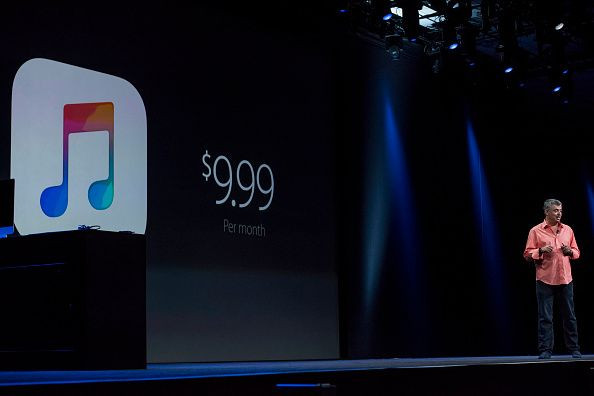WWDC 2015: Apple Music Is Coming This Month On iOS 8.4

When music went digital, it gained a problem just as big as piracy: fragmentation. Fans had to discover music in one place, engage with musicians elsewhere, and listen to it somewhere else again. On Monday, Apple announced it's trying to fix that with Apple Music, which Chief Creative Officer Trent Reznor called “one complete thought around music.”
The service will launch in over 100 countries later this month, on iOS 8.4. It will bow on Android later this fall. Here’s what’s in it.
Revamped Radio
Apple has had a radio product, iTunes Radio, since 2013, and while some industry analysts don’t see it as taking market share from Pandora or iHeartRadio, Edison Research estimates 30 percent of U.S. Internet users have used iTunes Radio to check out music.
Apple Music's new radio feature, Beats One, will feature 24-hour music programming to include interviews conducted by Zane Lowe, Ebro and Julie Adenuga. The service is designed to showcase new music, as well as playlists curated by high-profile tastemakers.
Big Catalog
Just like its competitors, Apple Music's service will ultimately be built on a catalog of music sourced from the world's three largest record labels, as well as a consortium of indies represented by Merlin. It adds up to more than 30 million songs available on demand. Apple and labels are reportedly still ironing out licenses, with the labels holding out for royalty rates higher than the ones they’re currently getting from Spotify and other streaming services, according to the Los Angeles Times.
Big Names...And Small Ones
It's been predicted that Apple would compete via exclusive content, and indeed the company has decided to host it on a platform, called Connect. Through Connect, artists can upload music and other media, including photos and video and social posts for users, and they can also use it as a place to broadcast out to fans. Connect was framed as something for unsigned artists looking to leverage a platform like SoundCloud as well as a place where established artists could connect. “Instead of having to spend your time posting on all these places, it all lives in one place,” the rapper Drake explained during Monday's WWDC presentation. “I can’t wait to incorporate Apple Music and especially Connect into what I’m doing next.”
Cross-Device, Including Android
Ever since it launched the iTunes Music Store in 2003, Apple has treated music as a way to lock consumers into its device ecosystem. This service follows suit. Merely plugging your headphones into an iPhone with iOS 9 is enough to bring Apple Music up onto the phone's launch screen. The service also integrates with Siri to allow people to access playlists as well as individual songs.
In an unusual break, Apple Music will also be available on Android devices, though it will come to Apple products first.
Apple intends to get to 100 million paying subscribers, about two and a half times the total number of people who currently pay for a streaming music service -- according to the IFPI, about 41 million people around the world paid for a streaming music subscription in 2014.
While it has a long way to go – it starts with the 300,00 paying subscribers it got when it bought Beats Music along with Beats headphones for $3 billion – it also has a lot to work with. Apple has more than 800 million credit card numbers on file from people that have made purchases either in iTunes or the App Store.
Though it's the undisputed king of the digital download market, Apple has seen the landscape shift toward streaming. Streaming has gone from the smallest share of Americans’ music consumption to the biggest through the first five months of this year, and streaming adoption will continue to expand. According to research from eMarketer, nearly 100 million U.S. smartphone users will listen to music via streaming service or direct download in 2015, a number that's estimated to top 134 million by 2019.
Apple Music will not have a free tier. It will cost $9.99 per month for an individual account, or $14.99 for a family plan that allows up to six users to have their own accounts. Apple's family plan significantly undercuts Spotify, which charges $30 a month for five family accounts.
© Copyright IBTimes 2025. All rights reserved.





















